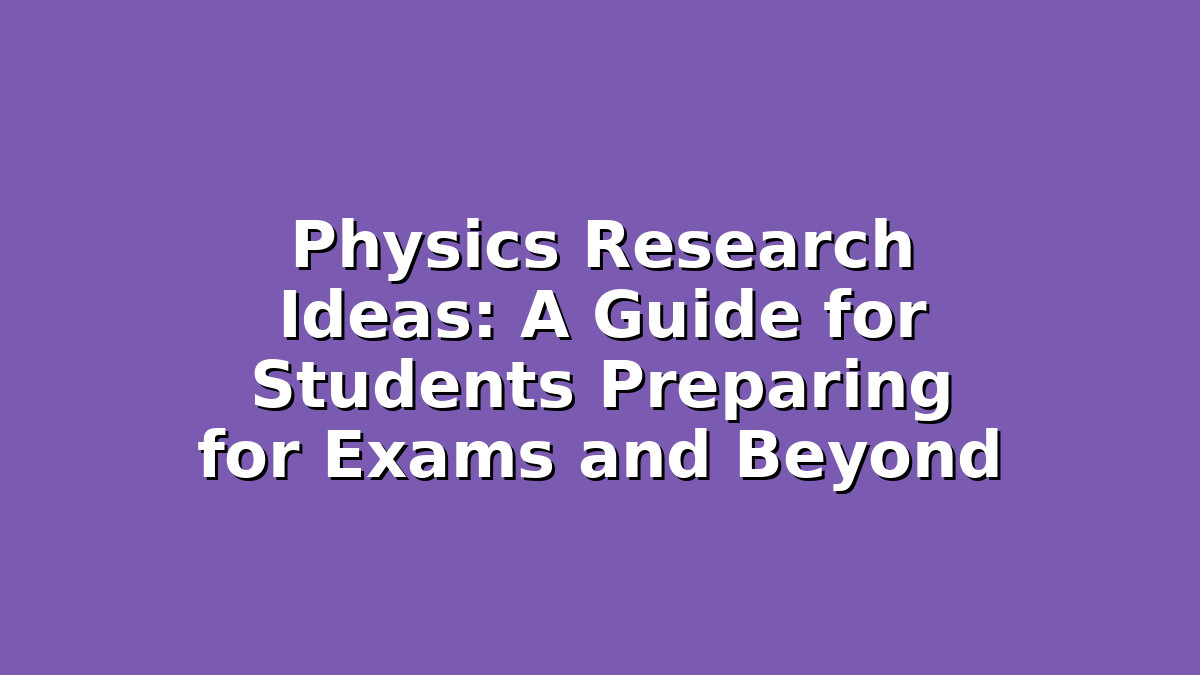Physics is a fascinating subject that unravels the mysteries of the universe, from the tiniest particles to massive galaxies. For students preparing for exams or looking to deepen their understanding, engaging in physics research can be both rewarding and enlightening. Not only does research help reinforce concepts learned in class, but it also develops critical thinking, problem-solving skills, and a scientific mindset—qualities that are invaluable in exams and future careers.
In this blog post, we will explore some exciting physics research ideas tailored for students, along with practical study tips and advice on how to make the most of your research projects. Whether you want to impress your teachers, boost your exam performance, or simply satisfy your curiosity, these ideas and strategies will set you on the right path.
—
1. Explore Fundamental Physics Concepts Through Simple Experiments
One of the best ways to prepare for physics exams is to deepen your understanding of key concepts through hands-on research. Simple experiments reinforce theoretical knowledge and help you visualize abstract ideas. Here are some beginner-friendly physics research ideas you can try at home or school:
– Investigate the Motion of Pendulums: Study how the length of a pendulum affects its period. By timing the swings and recording data, you can verify the mathematical relationship between period and length. This experiment helps you understand concepts like periodic motion, gravitational acceleration, and energy conservation.
– Study Hooke’s Law with Springs: Use different springs and weights to explore the relationship between force and extension. This experiment is perfect for grasping elasticity, restoring forces, and linear relationships in mechanics.
– Explore Refraction and Light Behavior: Using a glass of water and a pencil, observe how light bends when passing from air to water. This simple setup can lead you to research Snell’s Law, refractive indices, and wave optics.
Study Tip: Document your experiments carefully. Keep a detailed lab notebook with objectives, methods, observations, and conclusions. This habit will improve your scientific writing skills and help you revise concepts before exams.
—
2. Dive Into Contemporary Physics Topics for Deeper Understanding
Beyond the basics, exploring contemporary physics topics can make your study sessions more engaging and relevant. Researching modern physics ideas not only broadens your horizons but also shows examiners your initiative and passion for the subject.
– Quantum Mechanics Simplified: While quantum physics can be complex, focusing on introductory concepts like wave-particle duality, the photoelectric effect, or the uncertainty principle can be enlightening. Try creating visual aids or presentations to reinforce your understanding and explain these ideas to peers.
– Renewable Energy and Physics: Investigate the physics behind solar panels, wind turbines, or energy storage systems. For example, researching the photovoltaic effect or aerodynamic principles can connect classroom theory with real-world applications.
– Astrophysics and Space Science: Topics like black holes, gravitational waves, or the life cycle of stars are captivating. You can research current discoveries, analyze data from public space observatories, or simulate planetary orbits using software tools.
Study Tip: When researching contemporary topics, use reputable sources such as scientific journals, educational websites, and documentaries. Summarize your findings in your own words and link them back to basic physics principles to create a stronger conceptual framework.
—
3. Utilize Technology and Collaborative Learning to Enhance Research
In today’s digital age, technology offers powerful tools to support your physics research and exam preparation. Leveraging these resources can make studying more efficient and interactive.
– Simulation Software: Programs like PhET Interactive Simulations or Algodoo allow you to model physics experiments virtually. You can manipulate variables and observe outcomes without physical materials, which is great for visual learners and limited-resource environments.
– Data Analysis Tools: Learning to use spreadsheet software (Excel, Google Sheets) or basic programming languages (Python with libraries like Matplotlib) can help you analyze experimental data, plot graphs, and identify patterns. This skill is valuable for both research and exam problem-solving.
– Online Forums and Study Groups: Join physics forums, social media groups, or study platforms where you can ask questions, share research ideas, and receive feedback. Collaborating with peers promotes deeper understanding and exposes you to diverse perspectives.
Study Tip: Create a study schedule that includes time for independent research, virtual simulations, and group discussions. Mixing methods keeps your brain engaged and prevents burnout. Also, set short-term goals for each session to maintain focus and measure progress.
—
Conclusion
Engaging in physics research is an excellent way for students to enhance their exam preparation and foster a lifelong interest in science. Starting with simple experiments helps solidify core concepts, while exploring contemporary topics connects theory to exciting real-world phenomena. Incorporating technology and collaboration further enriches the learning experience, making physics both accessible and enjoyable.
Remember, research is not about perfection but curiosity and persistence. Don’t be afraid to ask questions, make mistakes, and explore new ideas. These habits will not only improve your exam performance but also prepare you for future academic and career challenges.
So, pick a topic that excites you, gather your materials (or digital tools), and start exploring. The universe of physics is vast and waiting for your discovery!
—

Responses